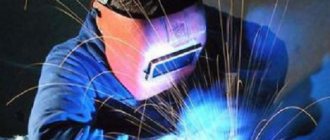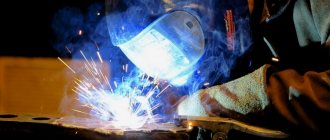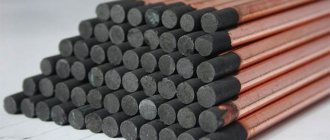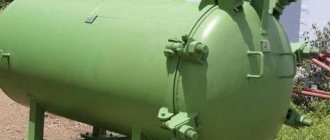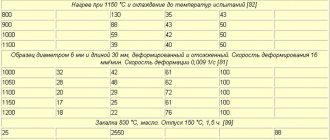Welder is a profession that receives special attention. Without these specialists, construction, production processes, manufacturing and repair of technical equipment are impossible, and the service life and quality of various structures depend on their professionalism. Therefore, particularly high demands are placed on the skills and abilities of welders.
Despite the great importance of professions based on science and mental activity, blue-collar professions . It is the work of ordinary workers, including welders, that makes it possible to implement the ideas and tasks facing inventors, managers, researchers, etc.
Who is a welder?
A welder is a worker who specializes in various types of welding. Although methods for melting and combining metal elements were known many centuries ago, the founder of welding is considered to be the Russian scientist V. Petrov, who invented the electric arc in 1802. The method is based on the formation of high temperature when current is passed through two carbon electrodes. Subsequently, such famous scientists as N.N. worked on improving and discovering new welding methods. Benardos, N.G. Slavyanov, E.O. Paton et al.
Welding was introduced into production so intensively that it almost completely replaced other methods of joining parts in the manufacture of metal structures.
Modern welders must:
- have basic knowledge of chemistry and physics;
- welding methods in practice ;
- have knowledge of the operating principles of welding equipment;
- keep records of work performed and draw up relevant documentation;
- know and follow safety precautions and labor protection instructions;
- be able to plan the volume and timing of work;
- know the technology of melting metals and the properties of gases used for anti-oxidation;
- follow the plan for technological preparation of production and analyze the rationality of using a certain technology for welding;
- contribute to the implementation of measures taken to increase the level of labor productivity;
- adhere to strict welding regimes;
- be able to draw up orders for the supply of materials and other parts necessary to complete the work.
Performing each type of work requires the welder to have the appropriate qualifications - a category that determines the specialty and responsibilities of the worker. There are 6 categories in total:
- Master in welding of plastic products. Responsibilities: dismantling and assembling parts for welding; preparatory work; simple welding of plastic parts and bags.
- Thermite welding specialist. Job functions include: reading and understanding blueprints; manual plasma and arc welding.
- A welder of the main and simplest types of welding specializes in manual and arc welding.
- Master of manual plasma and arc welding. He is trusted to work with more complex elements, and he also engages in manual oxygen cutting of highly complex parts.
- A specialist in welding complex assemblies and parts is a welder who can weld products under the influence of an electron beam, as well as welding vacuum structures.
- A wide-profile welder is proficient in all types of welding of any complexity. He can work in the oil and gas industry and in any areas of interest to him.
History of the profession
People mastered the first methods of welding back in the 8th–10th centuries BC. e. Then small pieces of metal (bronze, silver, gold) were forged and placed in a certain shape. Then it was heated and the previously prepared molten metal was poured onto the joints. The process was called foundry welding.
Iron parts were made by heating them in a forge and then forging the joints. This kind of welding was called forge or forge welding. With its help, various tools and weapons were made.
A qualitative leap in the field of physics and electricity occurred in the late 18th and early 19th centuries. First, the voltaic column was created as a long-lasting power source by the Italian A. Volta. And after that, our scientist V.V. Petrov in 1802 discovered the phenomenon of an electric arc between two carbon electrodes. Subsequently, it formed the basis of all electric welding, since the created temperature of about 5000℃ allows you to melt any metal.
Subsequently, Russian researcher N.N. Benardos invented the carbon electrode welding method in 1881. Then the first oxygen gas cutters, burners, and tungsten electrodes appeared. As welding technologies and methods developed, the welding profession began to be divided into categories, and the worker’s skill began to be assessed by qualification categories.
The professional holiday of workers in this profession is traditionally celebrated on the last Friday of May, since welders are busiest at this time.
What personal qualities should a welder have?
Welding specialists are characterized by heavy manual work, which requires good physical fitness, endurance and excellent health. A welder may be suspended from work if, during a medical examination, the following diseases are discovered:
- musculoskeletal system;
- nervous system;
- respiratory tract;
- sight and hearing.
Performing duties in areas with a high level of danger and at high altitude requires the presence of a developed vestibular apparatus.
In addition, to carry out welding work, the candidate will need attentiveness, responsibility and hard work. To avoid defects in connecting structures, all his actions must be careful and precise.
Working with a welding machine is suitable for people with spatial imagination and a technical mind. Patience and the desire to see things through to completion will be an advantage, while ambition and determination will help in moving up the career ladder.
Advantages of being a welder
One of the key advantages of the welding profession is the high demand and low level of competition in the labor market, which is associated with the reluctance of young people to perform unprestigious work. Welders are required in many industries, so it will not be difficult for a specialist to find a job in enterprises that deal with:
- construction of buildings and structures,
- provision of public services,
- mechanical engineering,
- oil and gas industry or agriculture.
He can also engage in individual entrepreneurship, which will allow him to independently plan his work schedule and carry out orders of interest.
Since the profession does not require long-term theoretical training, welders often begin working upon reaching adulthood. To obtain practical skills, secondary specialized educational institutions send students to enterprises, where they receive their first salaries and can officially find employment after receiving a diploma.
The specialty is one of the highly paid. The salary amount is set based on the specialist’s experience, qualifications and place of work. The monthly income of a welder with many years of experience is about 35-100 thousand rubles (the most attractive place for employment in terms of salary is the oil and gas sector). A specialist who has the necessary abilities and knowledge can develop in the profession and build a career, moving from foreman to department head and chief engineer.
View vacancies for Welder.
Related professions:
, Repairman, Electrician, Electrical and gas welder, Electrician
Useful courses:
Repair and service of small refrigeration machines (commercial refrigeration equipment)
Direction: Quality and standardization, Manufacturing and engineering
Ekaterinburg College of Economics and Technology
All courses in Manufacturing and Engineering
Disadvantages of being a welder
Very often, heavy physical activity negatively affects the health of the welder. Often a specialist has to work in uncomfortable positions in dangerous areas under adverse weather conditions. Over the years, respiratory problems and vision problems may occur. Negative working conditions also include the need to constantly use protective clothing and a mask. Although they provide protection from the harmful effects of welding , it is inconvenient to work in it.
Before applying for high positions and decent wages, a specialist will have to go a long way, honing his skills and abilities for years. Most aspiring welders find jobs at utility companies, which, according to statistics, have the lowest wages in the profession. On average, such an employee can count on a salary of about 20 thousand rubles.
Where can I get a welding profession?
The profession can be obtained at any technical school or college, where the specialties “Welder of electric and gas welding works” and “Operator of welding and gas plasma cutting equipment” are offered. Training takes place on the basis of 9 or 11 grades of secondary school, and the duration of the course depends on the educational institution. In schools, studies will last 3 years (for graduates of 9 classes) or 2 years (for 11 classes), and in technical schools and colleges - 4 and 3 years, respectively. The ranking of the best educational institutions of secondary specialized education by specialty includes:
- College of Architecture, Design and Reengineering No. 26 (Moscow);
- Petrovsky College (St. Petersburg);
- College of Water Resources (St. Petersburg);
- Nizhny Novgorod Industrial and Technological College (Nizhny Novgorod);
- Yekaterinburg Industrial and Technological College named after. V. M. Kurochkina (Ekaterinburg).
During the training process, students study theory, technology and work conditions. Before starting practical classes, they train for a long time on computer simulators, mastering the skills of working with a welding machine. From the third year of study, future specialists can be sent to various enterprises, where they practice the acquired knowledge.
Those wishing to become a gas-electric welder should take into account that access to gas equipment can only be obtained from 18 years of age. Therefore, gas-electric welders need to obtain a specialty directly in production or undergo an additional training course. Professional development will also require passing advanced training courses, the results of which are assigned the appropriate rank (from 1 to 6), and career advancement is often not possible without obtaining a higher education.
Admission to one of the following universities will allow you to obtain the profession of “Welding Engineer”:
- Moscow Aviation Institute (national research university);
- Peter the Great St. Petersburg Polytechnic University;
- Omsk State Technical University;
- Moscow State Technical University named after N.E. Bauman;
- Far Eastern Federal University.
Image sources: besplatka.ua, 74.ru, mirkosmosa.ru, gazeta.naftan.by
National Mineral Resources University "Mining"
Saint Petersburg
[22.03.01] Materials science and materials technology
| Type | Form | Price |
| Bachelor's degree | Full-time | 260 000,00 ₽ |
Moscow State Technical University named after N.E. Bauman
Moscow
[22.03.01] Materials science and materials technology
| Type | Form | Price |
| Bachelor's degree | Full-time | 257 572,00 ₽ |
Komsomolsk-on-Amur State Technical University
Komsomolsk-on-Amur
[22.03.01] Materials science and materials technology
| Type | Form | Price |
| Bachelor's degree | Full-time | 227 100,00 ₽ |
Russian Chemical-Technological University named after D.I. Mendeleev
Moscow
[22.03.01] Materials science and materials technology
| Type | Form | Price |
| Bachelor's degree | Full-time | 217 400,00 ₽ |
National Research Nuclear University MEPhI
Moscow
[22.03.01] Materials science and materials technology
| Type | Form | Price |
| Bachelor's degree | Full-time | 217 368,00 ₽ |
National Research Technological University "MISiS"
Moscow
[22.03.01] Materials science and materials technology
| Type | Form | Price |
| Bachelor's degree | Full-time | 210 000,00 ₽ |
Moscow Aviation Institute (national research university)
Moscow
[22.03.01] Materials science and materials technology
| Type | Form | Price |
| Bachelor's degree | Full-time | 203 630,00 ₽ |
National Research University "MIET"
Zelenograd
[22.03.01] Materials science and materials technology
| Type | Form | Price |
| Bachelor's degree | Full-time | 195 000,00 ₽ |
Moscow Polytechnic University
Moscow
[22.03.01] Materials science and materials technology
| Type | Form | Price |
| Bachelor's degree | Full-time | 184 800,00 ₽ |
National Research Tomsk Polytechnic University
Tomsk
Training courses for welders
In order for your studies to be professional and meet the requirements, you need to apply to organizations with a license for educational activities. Only in this case will the received diploma or state-issued certificate have legal force and will be accepted into the organization.
Anyone can learn the profession with the help of courses, even without experience in metal welding.
The courses study the theory of cutting and welding of metals; educational materials in an organization with a license to conduct educational activities offer information in accordance with the requirements of the laws of the Russian Federation and educational standards.
With the help of courses, they study not only theory, but also practice, since the acquired knowledge is tested in conditions close to working conditions.
Knowledge testing is carried out using special “simulators” - these are welding machines that belong to the organization (some allow you to bring your own machine), as well as devices with sensors that check the quality of welding in real time by recording information in a computer.
Upon completion of studies, a welder's certificate is issued, which indicates the rank from 1 to 6. Subsequently, the employee takes advanced training courses as a welder to obtain another rank.
Profession involves division into subspecies, for example:
- Electric and gas welders.
- Manual welders.
- Press welding, etc.
At the same time, a certificate is required regardless of the chosen direction of work.
Often courses last 16 academic hours or more. In some organizations, you can edit a course and choose more hours of training, or edit a set of disciplines.
